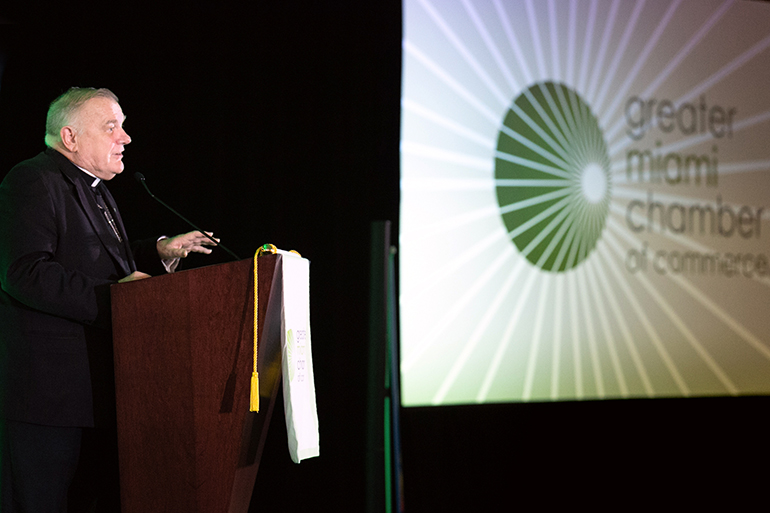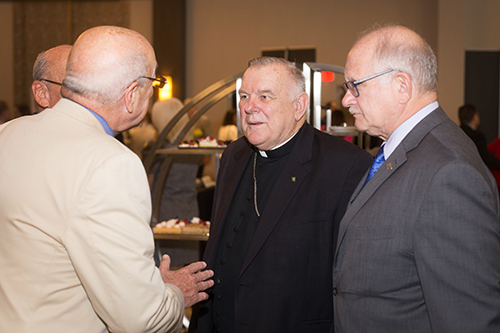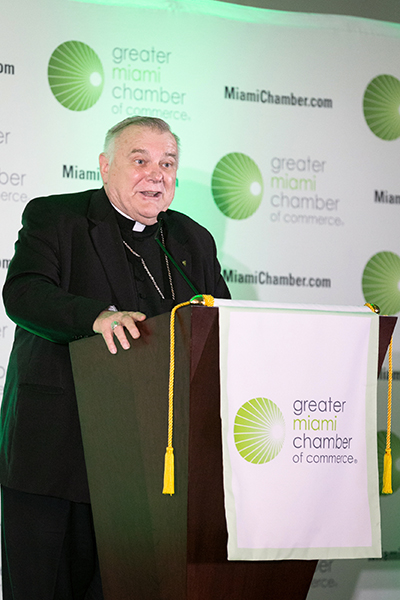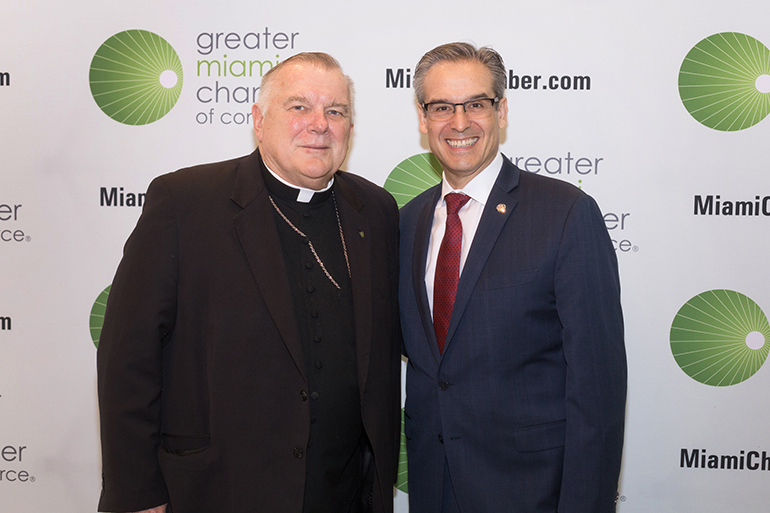By Archbishop Thomas Wenski - The Archdiocese of Miami

Photographer: TOM TRACY | FC
Miami Archbishop Thomas Wenski was a guest speaker Oct. 3 at the Greater Miami Chamber of Commerce Trustee Luncheon, held at Jungle Island in Miami. The archbishop spoke about the history of the archdiocese as it celebrates its 60th anniversary.
Archbishop Thomas Wenski delivered this talk at the October Trustee Luncheon of the Greater Miami Chamber of Commerce, Oct. 3, 2018.
I’m happy to be here at the Chamber. Thank you for having me. The Archdiocese of Miami, the local Church that I lead, includes some 110 parishes and missions in the three southeastern counties of Florida which serve more than a million and a half Catholics in almost a dozen languages and enroll more than 35,000 kids in our schools. With our school system, university, Catholic Charities and Catholic Health Services we employ more than 8,500 people.

Photographer: TOM TRACY | FC
Miami Archbishop Thomas Wenski chats with area business leaders after being the guest speaker Oct. 3 at the Greater Miami Chamber of Commerce Trustee Luncheon.
In 1940, Florida ranked 27th in population among the then 48 states. Twenty years later, when the Diocese of Miami was still in its infancy, Florida ranked 10th and today, as we all know, Florida is number 3 in population. As Florida’s population grew, so did the presence of the Catholic Church � as did the number of Catholics who moved here from the north � as well as from the south. Some would say that South Florida is New York City’s southernmost borough; others might say, it’s Havana’s northernmost suburb.
In 1958, the Diocese of Miami was created from the Diocese of St. Augustine which encompassed all of Florida except for Pensacola. Today, there are seven dioceses including the Archdiocese of Miami serving Catholics in Florida. Now, the Bishop of St. Augustine had thought that the division should be down the center of the state, with the Diocese of St. Augustine keeping the eastern portion of Florida. In fact, he had counted on it, for Archbishop Hurley, known as 10-acre Hurley for buying real estate in mostly 10-acre portions across the state, had bought a lot of land in South Florida. He didn’t invest in the stock market, he invested in real estate. And the division of the new diocese across the center � from east to west � represented a considerable loss for him and St. Augustine. He was slow turning over title to the various properties of the 16 southern counties of Florida to the Diocese of Miami’s new bishop, Coleman Carroll.
And this created no little difficulty for the new Diocese of Miami � because the growth of the Church in South Florida was not going to wait until the controversy was resolved. Indeed, a few months after the creation of the Diocese of Miami, the Cuban revolution would spur new growth and new challenges for South Florida. Since the dispute tied up land titles, the plans to build Biscayne College (now St. Thomas University) were held hostage and the new Diocese of Miami had difficulty in getting credit. Banks wouldn’t loan to it. Fortunately, besides being a good fundraiser, Coleman Carroll easily mixed with the people of influence and affluence. He was able to secure a $1,000,000 loan from an unlikely source, Jimmy Hoffa. Many eyebrows were raised. But that loan opened the doors for the Diocese of Miami to get further loans from the banks. And, eventually, with the help of the Pope, the property dispute was settled in the Diocese of Miami’s favor, giving it a tremendous land bank � acquired when land was still cheap � that positioned the Diocese of Miami to keep up with South Florida’s rapid growth.
And as they say, the rest is history.
Jesus once told his followers they are to be in the world but not of the world. As professionals in the business community, and successful ones at that, you are certainly “in the world.” Now, not to be of the world does not mean that we should somehow to be against the world. The Church is not “against the world.” On the contrary, as its many good works demonstrate, from welcoming refugees, educating the young, caring for AIDS patients, feeding the hungry, and through all the other corporate and spiritual works of mercy, the Church is called to be “for the world.”
As professionals in the business community, you too are called to be “for the world.” Your careers are ways in which you can be and are “for the world.” And in this sense, success in business cannot be judged solely on the bottom line � your business performance will be judged on that to be sure � you’re in business to do well for yourselves; but also, it will be judged on how it has helped you to achieve personal sanctification and how it has helped others achieve this as well � your business should be a means of you’re doing good for others.
In other words, you should see your business as a “vocation,” a way of being in the world but without becoming of the world, or simply worldly.
Worldliness or the separation of faith from life has always been a temptation from the earliest days of humanity; but it has become a real problem today. The tenets of our faith traditions often seem to have little to do with what is taught in MBA curricula.
The secularism that is increasingly dominant in our society affects the way we think and act � and the way we do business. I want to distinguish between an ideological secularism and a healthy secularity. Secularity is a way of understanding the world that distinguishes what pertains to the City of God and what pertains to the City of Man. Secularity recognizes the proper roles of Church and State without demanding the exclusion of religion from society. Secularism, as I tell kids at confirmations, is a 50-cent word that means pretending to organize one’s life or one’s society as if God does not matter.
How often have we been tempted to dismiss an ethical concern, how often have we stifled the voice of conscience in making a difficult decision by just saying: business is business?
Sometimes, as scandals remind us, and scandals are not lacking today � we find them in politics, in business and in the Church � scandals remind us that we are in the world � but too often the world is in us. In that sense, I feel that the Church is a bit like an airline company, the thousands of successful landings and take-offs are not reported on, it’s just the plane that crashes that makes the news.

Photographer: TOM TRACY | FC
Miami Archbishop Thomas Wenski addresses the Greater Miami Chamber of Commerce Trustee Luncheon, held Oct. 3 at Jungle Island in Miami.
Understanding that we are to be “for the world” � and understanding our commitment to success in business as a vocation � can help us avoid the separation of faith from the ordinary affairs of life. In this way, our work can become more than just complying with the standards and protocols of a company. Our work � what we do and how we do it � also can witness that “God does matter.”
In the Catholic tradition, work is not a curse. That would be the wrong way to interpret the book of Genesis. Work is a creative activity, and therefore an imitation of God’s own creative activity. For a believer, then, work is participating in God’s plan for the world. Made in the image and likeness of our Creator God we acknowledge ourselves to be his creatures when we labor in line with his purpose and we establish goals not only to do well but also to achieve what is good for ourselves and for others.
Too often, preachers often influenced less by Saint Mark as they are by Karl Marx try to make business people in the pew feel guilty for their success. There is nothing wrong in making a profit � in fact, when a firm makes a profit it shows that it has used its resources correctly and human needs have been satisfied. Nevertheless, profit is not the sole criteria for judging a firm’s condition. It is possible for the accounts to be in order, and at the same time the people who make up the community of workers could be humiliated and offended.
Work brings people together for the service of society. God made us as social beings and work is done within a community of persons. The marketplace provides many opportunities to be creative and productive and to create wealth. This is good but there is also an order of importance: Business manuals advise that the best companies are the ones that respect and care for their employees.
We are social beings � it’s the way that God made us. If our work, and our careers, undermine rather than strengthen the network of relationships that make up our lives, then something is wrong. In other words, if we allow ourselves to live � and to do business � as if God doesn’t matter, then our neighbors won’t matter, our employees and co-workers won’t matter, our families won’t matter, our marriages won’t matter.
I’d like to conclude on a lighter note by giving another anecdote from our history as a Church here in South Florida. There’s a story about Don Shula and Joe Robbie. The story is true � I had the occasion to confirm it with Coach Shula a couple of years ago.
Shula and Robbie had a terrible fight � Shula gave me his version, and it was Robbie’s fault. But they stopped talking to each other and the press was filled with rumors that Shula would leave Miami and the Dolphins. (This was before the perfect season.) Archbishop Coleman Carroll found out � both Shula and Robbie were Catholic. He got on the phone and called Robbie and said, “I need to talk to you�Come to my office.” He did the same for Shula and gave him his appointment.
When the day came, both men showed up � I guess at different times � because one did not know the other was there. They were taken by some Monsignor each to a different room. Now, Archbishop Carroll called a press conference for that same day. The press were all assembled, the Archbishop walked into the room and asked, “Are all you press people all here?” When they said “yes,” he told two monsignors, “Bring ‘em in.” From one door came Shula, from another, came Robbie � both a bit befuddled to find themselves in the middle of a press conference.
The Archbishop barked at both, “Shake hands.” They did. And then the Archbishop declared the press conference over. Shula stayed in Miami.
And that shows how the Archdiocese of Miami has been an integral part of our South Florida community helping all of us not only to do well but to do good.

Photographer: TOM TRACY | FC
Miami Archbishop Thomas Wenski poses with Alfred Sanchel, president and CEO of the Greater Miami Chamber of Commerce.

